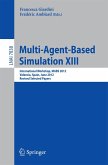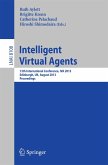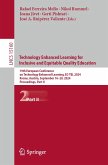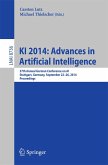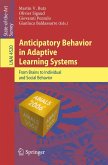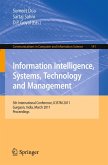Technology-Based Learning Environments (eBook, PDF)
Psychological and Educational Foundations
Redaktion: Vosniadou, Stella; Mandl, Heinz; Corte, Erik de
72,95 €
inkl. MwSt.
Sofort per Download lieferbar

36 °P sammeln
Technology-Based Learning Environments (eBook, PDF)
Psychological and Educational Foundations
Redaktion: Vosniadou, Stella; Mandl, Heinz; Corte, Erik de
- Format: PDF
- Merkliste
- Auf die Merkliste
- Bewerten Bewerten
- Teilen
- Produkt teilen
- Produkterinnerung
- Produkterinnerung

Bitte loggen Sie sich zunächst in Ihr Kundenkonto ein oder registrieren Sie sich bei
bücher.de, um das eBook-Abo tolino select nutzen zu können.
Hier können Sie sich einloggen
Hier können Sie sich einloggen
Sie sind bereits eingeloggt. Klicken Sie auf 2. tolino select Abo, um fortzufahren.

Bitte loggen Sie sich zunächst in Ihr Kundenkonto ein oder registrieren Sie sich bei bücher.de, um das eBook-Abo tolino select nutzen zu können.
This volume in the NATO Special Programme on Advanced Educational Technology approaches educational technology not from a technological but from a psychological and educational point of view.
- Geräte: PC
- ohne Kopierschutz
- eBook Hilfe
- Größe: 32.57MB
Andere Kunden interessierten sich auch für
![Multi-Agent-Based Simulation XIII (eBook, PDF) Multi-Agent-Based Simulation XIII (eBook, PDF)]() Multi-Agent-Based Simulation XIII (eBook, PDF)36,95 €
Multi-Agent-Based Simulation XIII (eBook, PDF)36,95 €![Intelligent Virtual Agents (eBook, PDF) Intelligent Virtual Agents (eBook, PDF)]() Intelligent Virtual Agents (eBook, PDF)40,95 €
Intelligent Virtual Agents (eBook, PDF)40,95 €![Engineering Societies in the Agents World X (eBook, PDF) Engineering Societies in the Agents World X (eBook, PDF)]() Engineering Societies in the Agents World X (eBook, PDF)40,95 €
Engineering Societies in the Agents World X (eBook, PDF)40,95 €![Technology Enhanced Learning for Inclusive and Equitable Quality Education (eBook, PDF) Technology Enhanced Learning for Inclusive and Equitable Quality Education (eBook, PDF)]() Technology Enhanced Learning for Inclusive and Equitable Quality Education (eBook, PDF)46,95 €
Technology Enhanced Learning for Inclusive and Equitable Quality Education (eBook, PDF)46,95 €![KI 2014: Advances in Artificial Intelligence (eBook, PDF) KI 2014: Advances in Artificial Intelligence (eBook, PDF)]() KI 2014: Advances in Artificial Intelligence (eBook, PDF)40,95 €
KI 2014: Advances in Artificial Intelligence (eBook, PDF)40,95 €![Anticipatory Behavior in Adaptive Learning Systems (eBook, PDF) Anticipatory Behavior in Adaptive Learning Systems (eBook, PDF)]() Anticipatory Behavior in Adaptive Learning Systems (eBook, PDF)40,95 €
Anticipatory Behavior in Adaptive Learning Systems (eBook, PDF)40,95 €![Information Intelligence, Systems, Technology and Management (eBook, PDF) Information Intelligence, Systems, Technology and Management (eBook, PDF)]() Information Intelligence, Systems, Technology and Management (eBook, PDF)40,95 €
Information Intelligence, Systems, Technology and Management (eBook, PDF)40,95 €-
-
-
This volume in the NATO Special Programme on Advanced Educational Technology approaches educational technology not from a technological but from a psychological and educational point of view.
Dieser Download kann aus rechtlichen Gründen nur mit Rechnungsadresse in A, B, BG, CY, CZ, D, DK, EW, E, FIN, F, GR, HR, H, IRL, I, LT, L, LR, M, NL, PL, P, R, S, SLO, SK ausgeliefert werden.
Produktdetails
- Produktdetails
- Verlag: Springer Berlin Heidelberg
- Seitenzahl: 302
- Erscheinungstermin: 6. Dezember 2012
- Englisch
- ISBN-13: 9783642791499
- Artikelnr.: 53105655
- Verlag: Springer Berlin Heidelberg
- Seitenzahl: 302
- Erscheinungstermin: 6. Dezember 2012
- Englisch
- ISBN-13: 9783642791499
- Artikelnr.: 53105655
- Herstellerkennzeichnung Die Herstellerinformationen sind derzeit nicht verfügbar.
Editors' Introduction.- I Design Principles for Learning Environments.- From cognitive theory to educational technology.- Toward the integration of computers in powerful learning environment.- Learning with computer-based exploratory environments in science and mathematics.- Modelling, a means for expressing thinking: ESRC Tools for exploratory learning research programme.- Knowledge application in complex systems.- Internalization and Learning Environments.- Learning: From interactivity to cooperation.- Peer interactions among adolescents using computer networks in an international role playing exercise.- Implementing a model of cognitive development in an intelligent learning environment.- Differences in patterns: Studying computer enhanced learning environments.- II Using Educational Technology to Promote Conceptual Change in the Physical Sciences.- Multimedia environments for enhancing science instruction.- The Mars Mission Challenge: A generative problem-solving school science environment.- Studying and teaching model-based reasoning in science.- Promoting studies on conceptual change.- Diagnosing students' physics knowledge and remediating learning difficulties: A computer-based approach.- Development of a learning environment for basic electricity.- Development of an information system to help conceptual change concerning the human nervous system.- Analysis of physics knowledge for learning environments.- Integrating computer software tools in learning environments for meaningful learning.- Ecoland: A hypermedia prototype for environmental education.- III Technology-Based Learning Environments for Knowledge Acquisition in Mathematics and in Language.- Multimedia environments for enhancing student learning in mathematics.- Tutoring mathematical text problems:From cognitive task analysis to didactic tools.- Less can be more: Unintelligent tutoring based on psychological theories and experimentation.- The use of an intermediate model for solving word problems.- Qualitative analysis of children's learning of programming in the context of a developing culture of open-ended project work in a primary school.- Computer-assisted learning to read and write: A three-year longitudinal study.- Computer facilitations of the writing process.- Flow driven English course.- IV Taking into Consideration the Needs of the Learner.- Investigating the use of knowledge profiles in a flexible learning environment: Analyzing students' prior knowledge states.- Knowledge and learning skill student model.- Semantic networks of action.- Representation systems in mathematics and science: The era of computers.- Use of graphics in computer aided learning in chemistry.- Effects of visible link-types on learning in hypertext systems.- Knowledge construction and acquisition in a hypermedia environment customized for learning purposes.- Hypertext learning environments and epistemic beliefs: A preliminary investigation.- Investigating motivation and cooperation in computer-assisted learning: A pilot study.
Editors' Introduction.- I Design Principles for Learning Environments.- From cognitive theory to educational technology.- Toward the integration of computers in powerful learning environment.- Learning with computer-based exploratory environments in science and mathematics.- Modelling, a means for expressing thinking: ESRC Tools for exploratory learning research programme.- Knowledge application in complex systems.- Internalization and Learning Environments.- Learning: From interactivity to cooperation.- Peer interactions among adolescents using computer networks in an international role playing exercise.- Implementing a model of cognitive development in an intelligent learning environment.- Differences in patterns: Studying computer enhanced learning environments.- II Using Educational Technology to Promote Conceptual Change in the Physical Sciences.- Multimedia environments for enhancing science instruction.- The Mars Mission Challenge: A generative problem-solving school science environment.- Studying and teaching model-based reasoning in science.- Promoting studies on conceptual change.- Diagnosing students' physics knowledge and remediating learning difficulties: A computer-based approach.- Development of a learning environment for basic electricity.- Development of an information system to help conceptual change concerning the human nervous system.- Analysis of physics knowledge for learning environments.- Integrating computer software tools in learning environments for meaningful learning.- Ecoland: A hypermedia prototype for environmental education.- III Technology-Based Learning Environments for Knowledge Acquisition in Mathematics and in Language.- Multimedia environments for enhancing student learning in mathematics.- Tutoring mathematical text problems:From cognitive task analysis to didactic tools.- Less can be more: Unintelligent tutoring based on psychological theories and experimentation.- The use of an intermediate model for solving word problems.- Qualitative analysis of children's learning of programming in the context of a developing culture of open-ended project work in a primary school.- Computer-assisted learning to read and write: A three-year longitudinal study.- Computer facilitations of the writing process.- Flow driven English course.- IV Taking into Consideration the Needs of the Learner.- Investigating the use of knowledge profiles in a flexible learning environment: Analyzing students' prior knowledge states.- Knowledge and learning skill student model.- Semantic networks of action.- Representation systems in mathematics and science: The era of computers.- Use of graphics in computer aided learning in chemistry.- Effects of visible link-types on learning in hypertext systems.- Knowledge construction and acquisition in a hypermedia environment customized for learning purposes.- Hypertext learning environments and epistemic beliefs: A preliminary investigation.- Investigating motivation and cooperation in computer-assisted learning: A pilot study.

